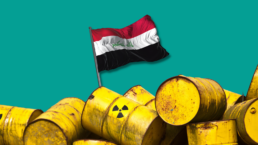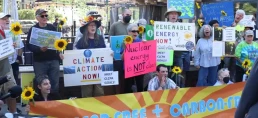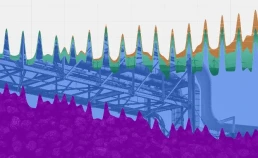Decades of war, poverty and fossil fuel extraction have devastated the country’s environment and its people.
By Lynzy Billing, Inside Climate News
It’s 6 p.m. and the pink-tinged skies turn black above Agolan, a village on the outskirts of Erbil in the Kurdistan region of northern Iraq. Thick plumes of smoke have begun to billow out of dozens of flaring towers, part of an oil refinery owned by an Iraqi energy company called the KAR Group. The towers are just about 150 feet from where 60-year-old Kamila Rashid stands on the front porch of her house. She looks squarely at the oil plant, which sits on what she says used to be her family’s land.
Rashid was born here, like her parents before her and her children after her. She says when KAR moved into the area, residents traded their land for KAR’s promise of jobs and reliable, less expensive electricity for the village. The land was handed over, Rashid says, but she maintains that KAR never provided the promised electricity or long-term jobs.

The towers, also called flare stacks, are used by oil refineries across the globe to burn the byproducts of oil extraction. Such flaring releases a menagerie of hazardous pollutants into the air, including soot, also known as black carbon. “The smoke coats our skin and homes with black soot,” says Rashid. Many villagers keep their windows shut and try to remain indoors whenever possible.
Rashid’s neighbor, 29-year-old Bilah Tasim Mahmoud, joins her on the porch. The younger woman is holding a beat-up notebook with the names of women from Agolan who have miscarried. “No one is counting, but I am,” she says, flipping through the notebook’s pages. “We have had 300 miscarriages in this village since the oil field was developed,” she says, adding that she has been collecting this data but has no one official to take it to.
Miscarriages, of course, are common everywhere, and while pollution writ large is known to be deadly in the aggregate, linking specific health outcomes to local ambient pollution is a notoriously difficult task. Even so, few places on earth beg such questions as desperately as modern Iraq, a country devastated from the northern refineries of Kurdistan to the Mesopotamian marshes of the south—and nearly everywhere in between—by decades of war, poverty, and fossil fuel extraction.
Recent Posts
Opposition of Nuclear Power ‘Revival’ in New York Holds its First Forum
January 22, 2026
Take Action Now This first forum, a webinar on Jan. 15, was titled a “Symposium for Safe and Affordable Energy in New York” as part of a series…
In Response to the Renee Good killing, Dems Propose ICE Reforms That Would Have Done Nothing to Prevent the Renee Good Killing
January 22, 2026
Take Action Now Good’s killer was a 10-year ICE veteran, himself a trainer, and recorded the killing. What good would more training and more cameras…
The Consequences Of Trump’s War On Climate In 7 Charts
January 21, 2026
Take Action Now Seven snapshots reveal how climate rollbacks altered the trajectory of U.S. energy, environmental protection, and economic security.……
Trump Received The Nobel Peace Prize From Maria Corina Machado. But Who Is She?
January 21, 2026
Take Action Now While Machado has played a pertinent and critical role for the US in causing chaos, disseminating propaganda, and pushing for regime…




